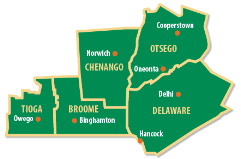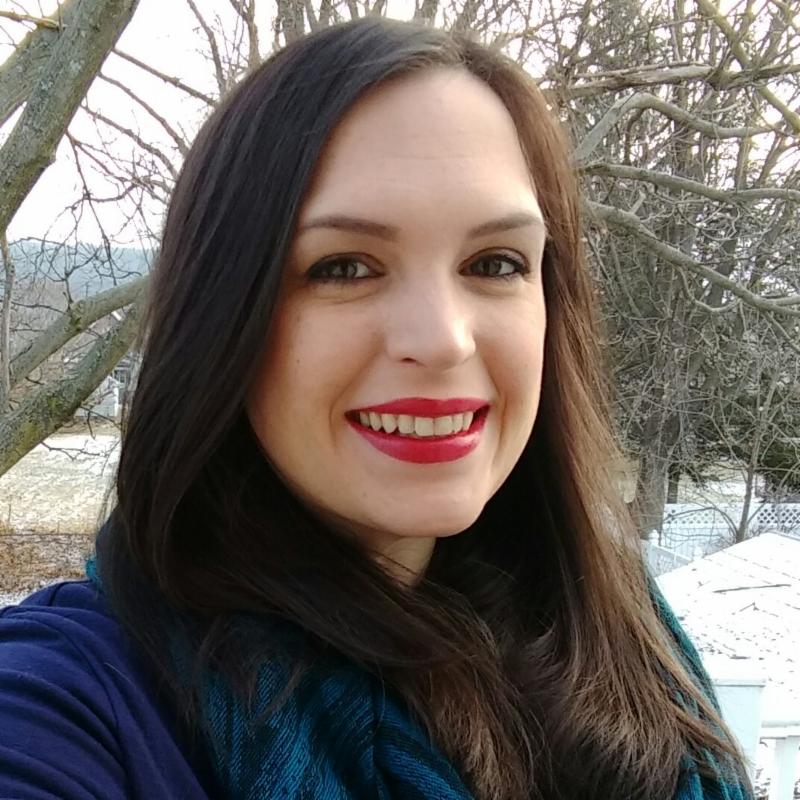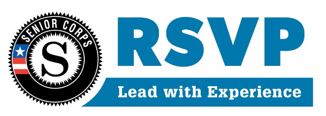In This Edition 
But Not for All
Transportation
|
|
Christian Caring Service -- Thirty Years of Caring
CARING (noun)--the
provision of what is needed for the well-being or protection of a person or thing
(adj)--
displaying kindness and concern for others
Caring
as a noun or an adjective is appropriate when describing the Christian Caring Service organization (CCS) and what they do for the community of Greene, New York. CCS
is a grass roots effort in the form of a group of
volunteer drivers coming together to provide transportation to people who have no means of obtaining transportation to important needed services. Their focus is
non-emergency medical transportation for appointments, though stops at a pharmacy for prescriptions that arise from the appointments are possible. Service is limited to residents of the Greene School District, in particular those who lack resources. Clients must be able to get in and out of a car on their own. There is no set fee for clients, but many offer a donation. Drivers are offered thirty cents per mile as reimbursement. CCS's service area is within a thirty mile radius.
The organization recently celebrated its 30th anniversary. Prior to Christian Caring Service, there was FISH (Friends in Service Here). FISH is actually a national organization of volunteers with chapters around the country that provide free transportation to medical appointments for the elderly and ambulatory disabled. The FISH group (CCS's predecessor in Greene) offered transportation for a variety of purposes, i.e. shopping, hair appointments and more; they disbanded in 1987, and a group of concerned members of the First Congregational Church UCC worked to fill the gap. They received support (in many forms) from the Greene Area Churches. The First Congregational Church UCC supported the effort, and the Greene Area Churches ecumenical group provided additional backing. Word went out for volunteer drivers and the result was Christian Caring Service.
Sharon Gagnon, who is currently president of the group, indicates that it has operated much the same way from the start. She describes the level of dedication and generosity of their volunteers as the backbone of the organization.  "Our reward is knowing that we help someone get needed medical attention. We consider our time well spent. Every trip to a PCP can save a future trip to the emergency room." She additionally cites the contributions of riders and the community as critical to enabling CCS to remain solvent all these years. "Our reward is knowing that we help someone get needed medical attention. We consider our time well spent. Every trip to a PCP can save a future trip to the emergency room." She additionally cites the contributions of riders and the community as critical to enabling CCS to remain solvent all these years.
CCS's call volume varies. 2016 was an average year for them, during which they provided 115 rides. Six years ago they had a record year, providing 246 rides. After that, the call volume dropped due to various circumstances such as some elderly clients moving out of the area, to nursing facilities, or passing away.
Christian Caring Service makes a huge difference in the community. Clients get regular medical attention, and their families get peace of mind knowing their loved ones are getting the care they need. "We want people in Greene to know about us and what we do."
When asked about future goals Sharon indicates, "We want to continue to provide help to those who need us. Recruiting new members is critical to our ability to do so. Like our residents, we are aging too. Some of our members have been drivers and/or dispatchers for many years and are slowly retiring from active service."
Drivers, dispatchers, and members change but the need remains. CCS remains ready to address the need. Contact
Sharon
about how to get involved. She can be reached by phone at 607-656-7730. 
|
|
| Some past and present members of CCS recently celebrated thirty years of service to the community of Greene. |
|
|
Travel Training:
The Way to Get There
Travel training is a relatively new endeavor; travel trainer is a relatively new profession. Travel trainers teach people with disabilities, older adults, young people and other interested travelers how to access and use public transportation independently. By partnering with clients to developing innovative solutions for accessing healthcare, increasing independence and increasing the connectivity of individuals with community resources in the most cost-effective manner, travel training improves lives and communities. The objective is to increase the independence of those being trained, to help them reach their full potential and thrive in their communities. Three perspectives largely define the focus: origin to destination, orientation, and how to use mobility devices on transit.
Travel training can include such topics as:
- Safety and awareness
- Reading and using system maps and schedules
- Trip planning, including making transfers
- Identifying, safely boarding and disembarking vehicles
- Paying fares
- Street crossing safety
- Accessibility features of buses, stops, and stations
- System rules/appropriate behavior
- Requesting stops and assistance with special needs
Since self-advocacy is important as a transit rider, clients also learn some of the basics, such as who and how to ask for help while riding the bus, as well as how to file a proper complaint if one encounters a problematic issue during a commute.
In South Central New York communities, a way to get there is through Mobility Management of South Central NY (MMSCNY). Assistance offered through MMSCNY's Getthere Call Center includes travel training. Their Mobility and Transportation Advocates Anne Marie Sanford, and Stephanie Eatton-Johnson can provide one-on-one and group travel training. Customized service is key to mobility management and guides all that MMSCNY does for people throughout the region and beyond. Sometimes travel training is the best solution for a caller.
Some recent examples of travel training sessions conducted by MMSCNY specialists will illustrate how travel training improves lives:
- A senior resident in our area called the Getthere Call Center, indicating that she wanted to be able to do some shopping on her own. However, she did not have a vehicle and had not used public transit in years.
- A group of developmentally disabled individuals were trained on the Oneonta Public Transit system. Those who were riding plan to use the bus for employment purposes.
- An elderly person from the area called Getthere to inquire about their services. She has been relying on friends or taxis to transport her since her husband passed away recently.
If you'd be interested in more specific details about these cases, and/or more about MMSCNY's travel trainers, see the complete article on our website. 
Our Travel Trainers:
Mobility and Transportation Advocates with MMSCNY
Our travel trainers, Stephanie Eatton-Johnson (left) and
Anne Marie Sanford (right), are critical to
operation of the Getthere Call Center, working with the MMSCNY t eam to deliver transp eam to deliver transp ortation assistance including case management, information and referral services, trip planning, travel training, and transportation education services to improve access to employment, health care and other essential services. There is a primary focus on helping older adults and people with disabilities who are transportation disadvantaged. ortation assistance including case management, information and referral services, trip planning, travel training, and transportation education services to improve access to employment, health care and other essential services. There is a primary focus on helping older adults and people with disabilities who are transportation disadvantaged.
For more information about travel training and/or other services, please contact the
Getthere Call Center
at 1-855-373-4040.
Phones are s
taffed from Monday through Friday, 7:00 am to 7:00 pm. 
is service of Mobility Management of South Central NY, which is a program of the Rural Health Network of SCNY.
|
|
MMSCNY Announcements
 |
|
 |
NOT Old News!
|
Getthere Sets New Record
This may appear to be old news; it is not. Getthere set a new record for the month of October. This is news that has been repeated
throughout the year, as the trend continues. 2017 had already experienced a record number of calls as of the end of September,
making 2017 the busiest year for MMSCNY so far
. During October, it happened again. October calls numbered 284,
placing the total for year-to-date calls at 1723 as of 10/31/17.
See the metric quick view below for reasons given by callers. 
Uber and Lyft - A Solution for Some, But Not for All
The trend reported above may address a suspicion that Uber and Lyft would reduce the need for transportation assistance in the area. While Uber and Lyft have offered a solution for some, our rural residents and the elderly continue to experience significant need, as ever-increasing Getthere call volume helps to illustrate.
Since a foundation of Uber and Lyft is the use of technology, a related
factor is that their use
can be is difficult (if not impossible) in areas with limited cell service. Many of the communities in our service area are in this category. 
William Wagner, Director, and Nick Cecconi, Assistant Director, MMSCNY, attended the New York Public Transit Association Conference in Albany, October 16th - 18th. This year's program focused on planning for significant changes in the world of transportation and mobility. Wagner gave a presentation on the
Transportation Voucher program, being piloted for Medicaid recipients in Broome, Chenango, Delaware, and Tioga counties.
The program assists individuals with such needs as transportation to get food, prescriptions and renewal of benefits-all important to health but not covered by Medicaid.
See Cecconi's comments on the conference, and the significant question communities face related to transportation and mobility in,
What Do We Really Want? below.

RTAP Review
In October, MMSCNY's meeting with representatives of NYSDOT and Milligan Associates for a 5311 review went well. 5311 is the Formula Grant for FTA's Rural Areas program, supporting public transportation in rural areas with populations of less than 50,000.
Periodic reviews are required by the Federal Transit Administration (FTA) to ensure that recipients of FTA assistance are in compliance with federal and state requirements. Additional objectives of the reviews are to identify and promote good practices, identify training and technical assistance needs and spend one-on-one time with recipients.
Holiday Hours
The Getthere
Call Center
(
1-855-373-4040) will be closed on
Christmas and New Years Day. Otherwise, days and hours are as usual, M-F, 7 am to 7 pm. 
|
|
What Do We Really Want?
(Nick Cecconi, Assistant Dir., MMSCNY)
There can be no doubt that we're seeing significant changes in the world of transportation and mobility; the broad effects these changes will have remains unclear. No one is really sure how they'll drive our behavior, how they'll affect our decision-making, our spending, our communities. The New York Public Transit Association Conference and Expo, which took place between October 16 and 18 in Albany, was about planning for these changes anyway. And it won't be easy.
Most of the conference sessions had at least something to do with shared-use mobility, which is, broadly, the completion of a trip using a bicycle, automobile, or other transportation mode that the user does not own. Whereas transportation had previously been about capturing mode share and therefore revenue through ownership of rolling stock (vehicles) and rights-of-way (roads), it is now about capturing trips. And as we're seeing, one needn't own any rolling stock to capture trips. To many, this is the future. People will stop purchasing cars or bikes - but they'll purchase the right to use them. Someone will purchase their right to use them. Every option will be available to every person all the time, a state of Ubiquitous Mobility. Ubiquitous Mobility!
So where does this leave transit providers? After all, they own lots of rolling stock, and employ lots of people to operate and maintain it at no small expense. It turns out, that's one of the things about which we're not so sure. It may be that the benefits of transit are amplified. In this scenario, people give up personal vehicles and use a combination of transit and shared modes to complete the trips they'd have otherwise made with their car. People will be able to get the same level of mobility they've come to expect with fewer cars, meaning less traffic, and less pollution. Cities will become more compact and streets more complete to meet the increased demand for shorter transit/pedestrian/bicycle trips. To many people, this sounds great. Just like New Coke. But it might not happen that way, and if you're asking me (if you're reading this, you are), there's a decent chance that it won't.
Instead, a combination of technology-enabled fuel efficiency, ease of use- especially if we're considering autonomous vehicles -- and the attractiveness of single-occupancy trips may drive mode share towards automobiles. Mega-companies will employ legions of autonomous vehicles to capitalize on the booming market for trips. Accordingly, personal vehicle trips will increase, along with congestion and infrastructure wear, while transit struggles to carry on with fewer passengers. So much for the promise and potential of Ubiquitous Mobility. Just like New Coke.
It's hard to predict which one of these futures will actually come to fruition, or even which one will be closer to the mark. Speculation varies widely on when we may see these things happen. This, of course, makes the whole planning aspect much more difficult -- but it is essential. The decisions we make in the next few years will have far-reaching and long-lasting effects. They will shape the very way our communities look and function; so to start planning, that is the question we need to ask. How do we really want our communities to look and function? 
|
COUNTY NEWS and NOTES

Broome County:
Ron Hirst (Broome County Transit) indicates that there is a need for bus drivers at this time. BC Transit recently had their FTA review; no issues were reported. The route planner on their website is live and a version for people who have visual impairments has been released.
|
|
Chenango County:
Chenango County is pleased to be a recipient of a Transportation Grant from the Rural Health Network SCNY/MMSCNY. The funds have provided the opportunity to assess what transportation resources are currently available and what changes are necessary to provide Chenango County residents access to safe, dependable transportation opportunities.
In order to reach and receive feedback on these mobility-related issues from as many County residents as possible, a twelve-question survey was developed for distribution. Thanks to the generosity and guidance of Snyder Communications, the survey was published and distributed throughout Chenango and neighboring counties in three bi-weekly publications. In addition to the advertised survey copy, numerous printed copies were provided to county and private agencies for distribution. To reach the technology astute population, the survey was posted on "Survey Monkey".
Since starting their outreach program in October, feedback from 140 residents has been received, primarily voicing personal experiences relating to the difficulty of accessing transportation to work and medical appointments.
Included among the responses are these: Fifty percent of respondents reported that they had lost or quit a job due to lack of transportation options. One third of the population responding reported that they had a disability. This data is providing a foundation to move forward in a positive direction with Phase Two, developing and coordinating a plan with various agencies and businesses throughout the county.
|
Delaware County:
Upcoming events at Delaware County OFA and Delhi Rehabilitation and Nursing Center:
Delaware County Office for Aging has moved to 97 Main St. in Delhi, and will be hosting an Open House on Wednesday, December 13, from noon - 4 pm for anyone who would like to stop in and say hello. Their phone number for contacts/referrals, etc. remains the same:
607-832-5750.
Delhi Rehabilitation and Nursing Center will showcase their facility and services with an Open House on Wednesday, November 29, from 10 am - 4 pm. Some area agencies will be staffing tables to showcase their services at the event.
|
Otsego County:
Otsego County hired and has been working with a consultant to identify transportation barriers and work with existing transportation providers to improve on what's available. Solutions for improving transportation for employment for seasonal and off-hours workers is among the issues being examined.
A need for CDL drivers in the area exists.
|
Addressing Transportation Needs for Seasonal Workers
Best Buy is working with Adecco (staffing agency) to fill several upcoming, seasonal, temporary job opportunities. As part of the effort, possibilities to address transportation issues potential applicants may face are being investigated. ICF* is working on development of a unique rideshare page through
BROOME-TIOGA Rideshare for applicants and new hires for these positions. The new hires--both those who have cars and those who are seeking transportation to work--are being encouraged to post their information. Potentially, some assistance in the form of ridesharing or carpooling opportunities will result. The
Getthere Call Center staff has received calls and have been assisting individuals who are experiencing difficulty navigating BROOME-TIOGA Rideshare.
Thus, potential employees are experiencing a unique initiative to assist with transportation issues, ultimately assisting with employment in Tioga County.

Tioga Opportunities, Inc. to offer RSVP program for volunteers
Tioga Opportunities Inc. is thrilled to announce the upcoming implementation of the Retired and Senior Volunteer Program (RSVP). RSVP is one of the largest volunteer networks in the United States for people aged 55 and over. In Tioga County, RSVP volunteers will provide transportation services for older adults to get to medical appointments, and will also deliver meals to homebound seniors throughout the county.
Volunteers will receive pre-service orientation, assignment-specific training, and supplemental insurance while on duty. Mileage and meal reimbursement will also be available. By becoming an RSVP volunteer, you'll forge new relationships with people in your community and make a significant difference in the lives of others by improving their health, well-being, and overall quality of life.
Recruitment efforts are now underway! Please contact Christine Shaver, Director of the Department of Aging at Tioga Opportunities, Inc., at 607-687-4120, ext. 313 to enroll in RSVP or for more information.
|
Did You Know?
What Is a Sharrow?
Sharrows are pa vement markings that improve cycling safety on streets that are too narrow for traditional bike lanes. These markings indicate to drivers that the road is a preferred bicycle route, and that they should be prepared to share the road with cyclists. The placement of the sharrow shows cyclists where they can ride to avoid traveling in the door zone of parked cars. vement markings that improve cycling safety on streets that are too narrow for traditional bike lanes. These markings indicate to drivers that the road is a preferred bicycle route, and that they should be prepared to share the road with cyclists. The placement of the sharrow shows cyclists where they can ride to avoid traveling in the door zone of parked cars.
You can find FAQs about sharrows on the BMTS website. 
Delaware County's Office for Aging offers Senior Transportation and Non-emergency, Health-related Transportation
Senior Transportation:
A coach-type bus with handicapped accessibility serves most of Delaware County. Different fixed routes, operating three (3) days a week have been established to help riders meet their shopping, medical and social needs.
Non-emergency, Health-related Transportation:
Transportation for Delaware County residents, 60 years of age and older, who are NOT on Medicaid, is available, on a limited basis, for those seniors unable to find transportation to health related appointments. At least five (5) working-days notice is needed to make necessary arrangements for transportation. Twenty-four (24) hours notice is requested for cancellations.
|
|
MMSCNY's Metrics Quick View
|
|
| Calls to Getthere this year to date have been for the above reasons. |
|
Funding is critical to MMSCNY's ability to continue to respond to increasing demand for services.
We hope you count MMSCNY among the causes you support.
#GivingTuesday, celebrated on the Tuesday following Thanksgiving, (11/28 this year), kicks off the charitable season, when many focus on their holiday and end-of-year giving.
This year, Rural Health Network of SCNY will be designating #GivingTuesday donations made on November 28th to
Connection to Care, which
focuses on rural, medically related transportation issues that are non-emergency in nature for individuals with financial need. To make an online donation supporting
Connection to Care,
visit our website.
If you'd like to make a year-end donation to MMSCNY, visit the RHNSCNY
donation page
.
If you'd prefer to send a check, direct it to us, c/o RHNSCNY, PO Box 416, Whitney Point, NY 13862.
You can earmark your gift to Getthere and/or Connection to Care by noting your designation(s) in the memo section.
MMSCNY staff wish you happy holidays.
|
Upcoming
Events, Conferences, Workshops, Save-the-Date
Friday, December 1 -- Tioga's County Transportation Group's quarterly meeting,
1 pm, at Tioga DSS
Thursday December 14 -- MMSCNY Advisory Committee quarterly meeting, 12:00, at
STIC.
NOTE:
The December 14th Coordinated Transportation Committee meeting (usually at 1:30 pm) has been cancelled. A BMTS report will be given at the MMSCNY meeting, along with an opportunity to ask questions.
Tioga's County Transportation Group's monthly meeting - Monday, January 8, 11 am, at CCE Tioga, 56 Main Street, Owego.
The 2018 Tioga County Transportation Committee meetings (other than quarterly meetings, which are 1st Fridays at 1 pm at DSS) will be at 11 am on Monday:
January 8th,
February 12th,
April 9th,
May 14th,
July 9th, October 15th, and
November 12th.
August - no meeting
MMSCNY Advisory Committee meetings for 2018, including monthly and quarterly meetings, will be circulated soon.
Quarterly meetings are held immediately prior to BMTS' Coordinated Transportation Committee meetings.
Those interested in attending or learning more about MMSCNY Advisory Committee meetings should email Bill Wagner. 
|
|
GetThere Call Center Hours

now 7:00 am to 7:00 pm weekdays
|
|
|
|
Important--please note that the option below to unsubscribe will remove your name from ALL of the RHNSCNY agency's mailing lists.
|
|
|
|